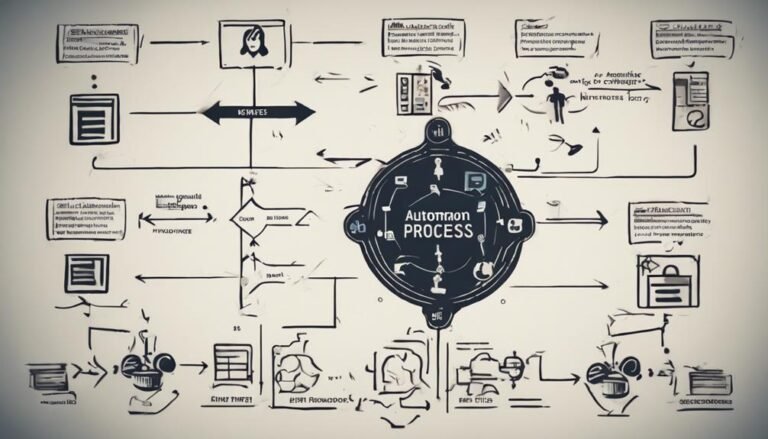Data-Driven Decision Making for SMEs
Data-driven decision making has become a cornerstone for successful businesses, particularly for Small and Medium Enterprises (SMEs). The ability to harness data to drive key business choices has shown promising results, but what exactly makes it so vital for the growth and sustainability of SMEs?
By exploring the tangible benefits, practical strategies, and real-world applications, we can uncover how data-driven decisions not only shape the trajectory of businesses but also revolutionize the way decisions are made at every level.
Key Takeaways
- Vital for growth and sustainability, enhancing operational efficiency.
- Provides competitive advantage and enables informed choices.
- Facilitates effective resource allocation and increased efficiency.
- Overcomes resistance to change, fosters evidence-based decision-making.
Importance of Data-Driven Decisions
In today's rapidly evolving business landscape, the importance of leveraging data-driven decisions for Small and Medium Enterprises (SMEs) cannot be overstated. By embracing data-driven decision-making processes, SMEs can significantly enhance their operational efficiency and gain a competitive advantage in the market.
One of the key benefits of data-driven decisions for SMEs is the increased efficiency they bring to various aspects of the business. Through the analysis of data, businesses can streamline their operations, optimize workflows, and identify areas for improvement. This efficiency not only leads to cost savings but also allows SMEs to allocate resources more effectively, leading to better overall performance.
Furthermore, data-driven decisions provide SMEs with a competitive advantage by enabling them to make informed choices based on concrete insights rather than intuition or guesswork. By utilizing data analytics tools, SMEs can better understand market trends, customer preferences, and internal processes, ultimately positioning themselves ahead of competitors who rely on less data-driven approaches.
Benefits for SME Growth
Realizing measurable expansion, data-driven strategies propel the growth trajectory of SMEs by facilitating informed decision-making processes. By leveraging data analytics and insights, SMEs can achieve significant benefits for their growth:
- Increased Efficiency: Data-driven decision making streamlines operations, identifies bottlenecks, and optimizes processes, leading to improved efficiency across the organization.
- Competitive Advantage: Utilizing data allows SMEs to stay ahead of competitors by identifying market trends, understanding customer preferences, and adapting strategies swiftly.
- Informed Decision Making: Data provides SMEs with valuable insights that enable leaders to make strategic decisions based on facts rather than assumptions, reducing risks and uncertainties.
- Targeted Marketing: Data-driven strategies help SMEs personalize marketing efforts, target specific customer segments, and tailor products or services to meet the evolving needs of their target audience.
Through these benefits, SMEs can not only foster growth but also create a sustainable competitive edge in the market.
Strategies for Implementation
To effectively implement data-driven decision making for SMEs and capitalize on the growth opportunities it offers, establishing clear strategies is imperative. Implementation challenges often arise when integrating data-driven decision-making processes within small and medium enterprises (SMEs). One of the key challenges is the resistance to change from employees accustomed to traditional decision-making methods. Overcoming this resistance requires effective communication, training, and demonstrating the benefits of data-driven approaches.
Technology integration is another critical aspect of implementing data-driven decision making. SMEs may face challenges in selecting the right technology solutions that align with their specific needs and budget constraints. Ensuring seamless integration of data analytics tools, cloud computing services, and other relevant technologies is essential for successful implementation. It is important to carefully evaluate different technology options, consider scalability for future growth, and provide adequate training to employees to leverage these tools effectively.
Real-World Examples
Drawing from practical experiences in various industries, examples of successful implementation of data-driven decision making in SMEs highlight the tangible benefits of leveraging analytics for informed business strategies.
Case Studies and Practical Applications:
- Retail Sector:
A small clothing boutique used sales data to identify customer preferences, leading to a 20% increase in revenue by stocking popular items.
- Healthcare Industry:
A local clinic improved patient care by analyzing appointment scheduling data, reducing waiting times by 30%.
- Manufacturing Firm:
A small factory optimized production processes through data analysis, resulting in a 15% decrease in operational costs.
- Hospitality Business:
A boutique hotel enhanced guest satisfaction by utilizing guest feedback data to make personalized service recommendations, leading to a 25% increase in positive reviews.
These real-world examples demonstrate how SMEs can effectively apply data-driven decision-making techniques to drive growth, increase efficiency, and enhance customer satisfaction across different sectors. By leveraging data analytics, these businesses were able to make informed decisions that positively impacted their bottom line and overall performance.
Impact on Decision Making
The utilization of data-driven decision-making techniques in small and medium enterprises (SMEs) has a significant impact on enhancing the accuracy and effectiveness of strategic decision-making processes. By leveraging data analytics, SMEs can mitigate the influence of behavioral economics and cognitive biases that often impede sound decision-making. Data-driven insights provide a more objective basis for evaluating options, reducing the reliance on subjective judgments that can be influenced by biases.
Moreover, incorporating data into the decision-making process helps in overcoming organizational culture barriers that may hinder the adoption of innovative strategies. It enables SMEs to break away from traditional decision-making approaches rooted in subjective opinions or hierarchical structures, fostering a culture that values evidence-based decisions.
Conclusion
In conclusion, data-driven decision making is crucial for SMEs to drive growth and success. By utilizing data to inform their decisions, businesses can gain valuable insights, identify opportunities, and mitigate risks.
Implementing strategies for data-driven decision making can lead to improved outcomes and competitive advantage in the market. As the saying goes, 'knowledge is power', and in today's data-driven world, businesses that harness the power of data will thrive and stay ahead of the curve.







